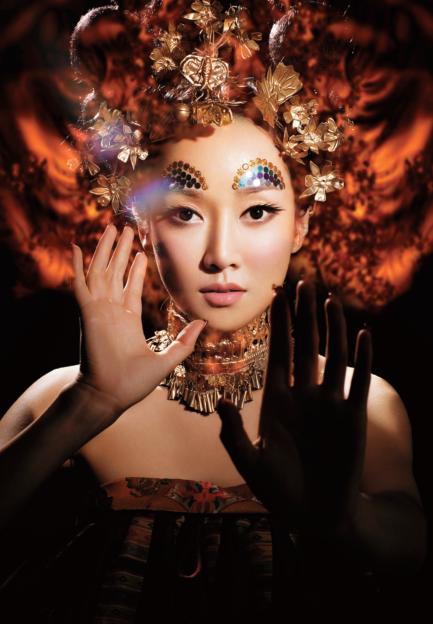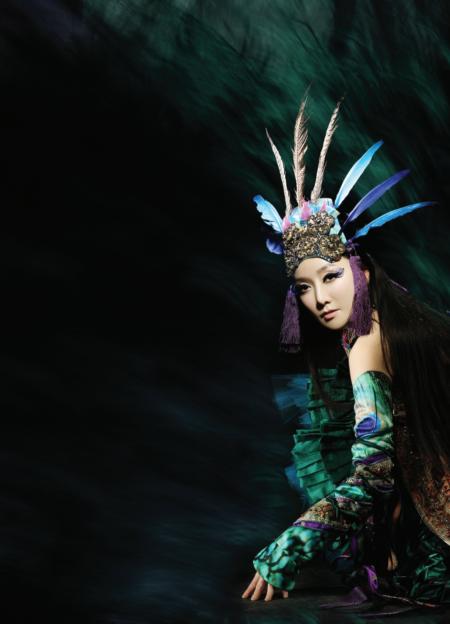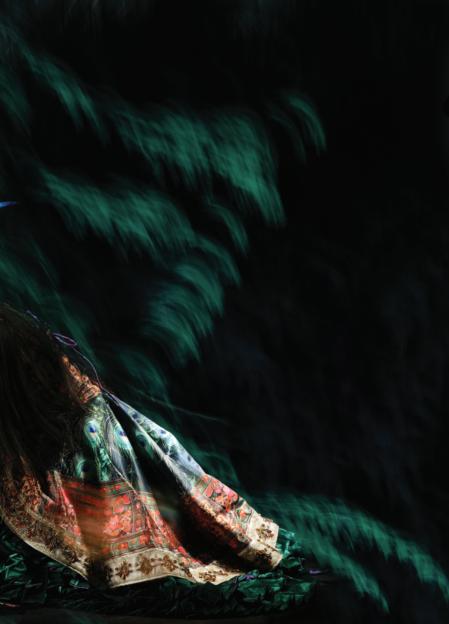國際展貿中心匯星

演出長約1小時30分鐘,不設中場休息 Running
演出及製作 Credits
歌手
薩頂頂
Vocals Sa Dingding
鼓手
劉為
Drums Mico Liu
低音結他
劉文泰
Bass Guitar Liu Wenthai
鍵盤
彭博
Keyboard Peng Bo
原生態演員
高洪章、自學空(楊三)
Performers, Indigenous Art Gao Hongzhang, Zi Xuekong (Yang San)
古箏/琵琶
章益
Guzheng/Pipa Zhang Yi
馬頭琴
斯日古冷(阿冷)
Matouqin Si Ri Gu Leng
音響
郭晉剛
Sound Guo Jingang
燈光
莘明
Lighting Shen Ming
多媒體設計
豐江舟
Multimedia Design Feng Jiangzhou

媽媽天哪
詞 祈請上師文第一句
曲 薩頂頂、黃毅
陀羅尼
詞 寶篋印陀羅尼
曲 薩頂頂
飛鳥和花
詞 香蝶
曲 薩頂頂
萬物生
詞 薩頂頂
曲 薩頂頂、黃毅
錫林河邊的老人
曲 張宏光
Mama Tian Na
Lyrics Qi Qing Shang Shi
Music Sa Dingding, Huang Yi
Tuo Luo Ni
Lyrics Bao Qie Yin Tuo Luo Ni
Music Sa Dingding
Flickering with Blossoms
Lyrics Xiang Die
Music Sa Dingding
Alive
Lyrics Sa Dingding
Music Sa Dingding, Huang Yi
Oldster by Xilin River
Music Zhang Hongguang
THE ORIGIN
文:薩頂頂
中國西南部的佤族部落裏,流傳着一個 美麗的傳說:從前天與地由一棵大樹連 接,天地間混混沌沌毫無生氣。人們只
能棲息在山洞裏,一天一隻金色的公雞 來到樹下,用力踢打這棵樹。終於, 公雞踢倒了大樹,一瞬間天地分開,混 沌之氣散去,萬物開始孕育,人們從此 走出了山洞,擁有了廣闊而神奇的大 自然。
我非常感動於這個開天闢地的傳說,天 地萬物經歷着無限的輪迴,並生生不息 的相互轉換。作為人,我崇拜幻想,每
個清晨,我都試着把自己的心性幻化成 另外的什麼,水、空氣,或任何存在, 於是我知道了花朵的歡喜,也知道了水 滴的憂傷。每當我在這一刻,我便能盡 情的感受着無限的世界!
我們所能看到的世間的一切,都是塵埃 一樣微小的存在,但當我們心中有了願 望,我們便能孕育出無限的力量。人與 自然的微妙關係小到我,大到不可思 議。我在幻想中發現,並用音樂寫下了 日記,這日記記述了我發現中的喜悅, 也是我對大自然的讚美詩。
就在這一刻,請你與我同行吧!回到最 初,暫且放下我們作為人類驕傲強勢的 一面,用我們的耳朵眼睛,手指的溫度 以及無限的想像,踏上去尋找天地初始 時人與自然的那份和諧統一的旅程,去 感受作為人類的那份喜悅,找到那個與 世間萬物共同生活在大自然裏的,最本 真的,擁有無限希望與力量的你。
Text: Sa Dingding
According to an ancient legend of the Wa ethnic group from Southwest China, there was once only lifeless chaos in the Universe. The sky and the earth were all mixed up, connected by a big tree. People lived hidden in caves. One day, a golden rooster came to the tree, and began to kick it. After much effort, the rooster knocked the tree over, and suddenly, the sky and the earth were separated. From that moment, chaos cleared, everything started to grow, and people moved out of the caves to enjoy the magic and beauty of nature.
I was so moved by this legend. The Universe we live in is an infinite space, everything is in an eternal cycle of birth, suffering, death, and rebirth. As a human, I adore our imagination. Every morning, I imagine my soul as something else, such as air, water, or some other creation. By doing this, I am able to experience a flower’s happiness and the sadness of waterdrops. By doing this, I can enjoy the beauty and magic of all that surrounds us.
Compared to the Universe, we are as small and insignificant as a speck of dust; but our hopes and dreams give us power and strength. I write my dairy through music. It records my joy through discovery and is my tribute to nature.
Right now, I invite you to join my journey. Let’s go back to the very beginning - throw away your human pride and vanity; open your eyes and ears, use the warmth of your fingers and your imagination to rediscover the harmony between people and nature as it was at the beginning of the Universe. I want you to feel the happiness of being human through this journey; and for you to discover the most genuine, faithful person inside you who shares life peacefully with all creation, and is in possession of boundless hope and power.
尋找天地間的節奏
── 薩頂頂的神秘吟唱
傳說中天與地連在一起 永不分離
勤勞的人們和那些神奇的動物生活在山洞裏 啊咿 下過雨的清晨一束光照着樹神
遠遠傳來隆隆的鼓聲
沉沉的鼓聲陣陣 震醒山洞裏的人 牆上的預言這就要發生 ⋯⋯
薩頂頂《天地記》

文:鄭傳鍏
不知道是否慣例,看楊麗萍的雲南舞蹈秀,一開 始搬演的是少數民族開天闢地的神話。同樣,薩 頂頂推出的第二張大碟,演繹「雲南概念」的
《天地合》,主打歌〈天地記〉一開始唱的也是一 個開天闢地的傳說。雖然不同的少數民族有着不同 的故事情節,但鼓在開天闢地神話中總是扮演必不 可少的角色,在《天地合》這張大碟中,她採集當 地彝族的巫鼓——一邊吟唱祭詞,一邊打鼓——的 節奏,滲進現代的電子節拍中,成為最大的特點。
薩頂頂這位電影《錦衣衛》主題曲的演唱者,可能 是整部電影台前幕後中最有國際知名度的一人。有
着蒙古血統的她以一首主打西藏概念的《萬物生》
上位成功,第二張大碟則是採風自雲南,中間的選 擇有什麼考慮?「其實做《萬物生》時的音樂構想 就包含了蒙古、雲南等地的音樂元素,只不過是聽
眾特別留意其中西藏的部分而已。」學密的薩頂頂 如是說(的確,西藏是中國諸多少數民族元素中, 最能挑動國際聽眾的一種)。「《萬物生》是希望通 過音樂讓人可以寧靜內心,講到了人與宗教的關 係。後來覺得與其讓他們聽到之後思考,不如先讓 他們喜悅。所以這次《天地合》的基調是喜悅,講 的是人與人,人與萬物的關係。」對於雲南,她特 別提到當地少數民族對自然環境的敬畏、獨具特色

的想法。「那裏的人很容易滿足,喜悅遠遠 越過北京、上海等大城市的人。」
在雲南,鼓除了是樂器,更是少數民族祭 祀、崇拜的用具和圖騰,在生產生活中也不 可或缺。但隨着傳統部落社會的解體,種種 相關的非物質文化遺產,包括音樂和舞蹈都 面臨失傳的危險。像薩頂頂從雲南帶回來採 樣的巫鼓音樂,就只剩下一人能演了。
薩頂頂演出最大的特點,可能是她結合了梵 文與自創語言的吟唱,在電子節拍下啊咿啊 咿,無論是西方人還是中國人,都不會明白 (事實上她有部份歌詞乾脆就是注音符號, 難言有什麼意思。)「不要用語言去區分音 樂,音樂的語言才是最重要,要創造出屬 於亞洲的音樂語言才有競爭力。」這位 BBC 世界音樂大獎的得主說,就算你是用不同的 語言來唱,但聽在別人耳中還是他們慣有的 音樂,也就不會有興趣。而所謂新的音樂語 言,是要靠節奏去更新,各種音樂的中心區 別就是節奏。「現在流行音樂的主流是來自非 洲的節奏。」薩頂頂說,「我們有自己的內 心律動,可以找到『中國節奏』」,那要到那 裏找這種節奏?她提到了睡夢中聽到樓下老 人家們的各種活動,發現某些節奏是所有中 國人一打就出來的,像「咚鏘咚鏘咚咚鏘」, 這種東西就是「中國節奏」。
但如何把這種「中國節奏」推到世界則是另 一個問題。「世界音樂」在音樂工業的版圖 中或多或少要承受西方人獵奇的眼光,是唱 片店中和流行、古典鼎足而三的門類,或者 說是「給購買者提供方便的標籤」,而少數民 族音樂在中國音樂的語境中也帶有類似的狀 況。薩頂頂指亞洲人的聽覺習慣缺乏自信心, 「尤其是在中國」。新的理念新的信息難被 接受,產業受到壓制,加上如今唱片難賣的 現況,讓中國音樂人不得不去模仿,「這是市 場的無奈,沒有多少人能頂住這種壓力」她 說。要讓中國的流行音樂有多樣性的發展, 需要大膽地去幫助音樂家,以勇往直前的精 神,表達自己的審美價值。
薩頂頂強調音樂語言,而非語言,不是沒有 代價的。她的音樂,變得需要附加的說明, 來解釋 26 種雲南少數民族的神話與文化。而 這本附加的說明書,就是她的音樂會,用她 的說法形容這個曲目結合《萬物生》與《天 地合》兩張大碟的音樂會,是「多媒體的MV 說明書,像作夢的感覺,是對我的音樂的強 大說明」。
鄭傳鍏,賣文維生,喜好電影及表演藝術。
After coming in second in a television talent show, she recorded a debut album that she now dismisses as “childish” because she had very little say in its material or production. Taking control of her career, she began recording demo versions of mantras, Tibetan chants, Sanskrit poetry and what initially appear to be folk songs sung in Chinese but are actually sung in her own selfcreated “language”.
The Universal A&R executives who heard these recordings quickly signed Sa onto their label. She then found herself in international demand. As the world focused its attention on Beijing in 2008, she was seen not only as a voice from the heart of contemporary China, but also a representative of China’s 21st century future and its ancient, rural past.
“I think there is a lack of communication between people in the West and East. What I want to do is help people communicate. When I go abroad, people are very friendly, very interested in me because I am Chinese. I love the culture of my country, so part of my job is to introduce this culture to people in the West.”
Sa’s first European show was in front of a large, expectant crowd at the WOMAD festival; her second British date was a BBC Prom in the Royal Albert Hall, where she celebrated winning a coveted Radio 3 Award for World Music.
“The theme of Alive, was the relationship between humans and religion. This time I wanted to go further back and look at the relationship between humans and nature. Harmony goes back to our original relationship with the earth. Musically it is about the balance between East and West, traditional and modern. I wanted to do something that was more than just Chinese folk elements laid on a western electronic base. I wanted to start from the roots of Chinese ethnic music and develop them for the modern electronic world.”
From Sa’s discussions about music with De Vries, came a further three songs — Ha Ha Li Li, Lucky Day and the mantra Xi Carnival Lucky Day is Sa’s first recording in English, with lyrics that De Vries wrote about his experiences in China set to beats that Sa had decided should be a tribute to Michael Jackson (this was four months before his death).
“Harmony is an expression of my thoughts and my life from spring 2009. When I was recording my first album I realised there are many things that bother people and I wanted them to find calm in my music. Now I realise that this calm can only come from finding a balance between humanity and nature. If people found calm from Alive, I hope they find joy and happiness from Harmony.”
Feature provided by the artist
It was while on tour in Europe that she met producer Marius De Vries (U2, Björk, Rufus Wainwright) whom she invited to work on her second album. She then travelled to Yunnan province in southwestern China to record sounds to incorporate into her new songs.








